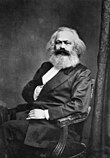
A | B | C | D | E | F | G | H | CH | I | J | K | L | M | N | O | P | Q | R | S | T | U | V | W | X | Y | Z | 0 | 1 | 2 | 3 | 4 | 5 | 6 | 7 | 8 | 9
This article needs additional citations for verification. (February 2023) |
| Part of a series on |
| Marxian economics |
|---|
 |
| Part of a series on |
| Marxism |
|---|
 |
Marxian economics, or the Marxian school of economics, is a heterodox school of political economic thought. Its foundations can be traced back to Karl Marx's critique of political economy. However, unlike critics of political economy, Marxian economists tend to accept the concept of the economy prima facie. Marxian economics comprises several different theories and includes multiple schools of thought, which are sometimes opposed to each other; in many cases Marxian analysis is used to complement, or to supplement, other economic approaches.[1] Because one does not necessarily have to be politically Marxist to be economically Marxian, the two adjectives coexist in usage, rather than being synonymous: They share a semantic field, while also allowing both connotative and denotative differences.
Marxian economics concerns itself variously with the analysis of crisis in capitalism, the role and distribution of the surplus product and surplus value in various types of economic systems, the nature and origin of economic value, the impact of class and class struggle on economic and political processes, and the process of economic evolution.
Marxian economics—particularly in academia—is distinguished from Marxism as a political ideology, as well as from the normative aspects of Marxist thought: this reflects the view that Marx's original approach to understanding economics and economic development is intellectually independent from his own advocacy of revolutionary socialism.[2][3] Marxian economists do not lean entirely upon the works of Marx and other widely known Marxists, but draw from a range of Marxist and non-Marxist sources.[4]
Considered a heterodox school, the Marxian school has been criticized by claims relating to inconsistency, failed predictions, and scrutiny of nominally communist countries' economic planning in the 20th century. According to economists such as George Stigler and Robert Solow, Marxist economics are not relevant to modern economics, having "virtually no impact"[5] and only "represent a small minority of modern economists".[6] However, some ideas of the Marxian school have contributed to mainstream understanding of the global economy. Certain concepts developed in Marxian economics, especially those related to capital accumulation and the business cycle, have been fitted for use in capitalist systems; one such example is Joseph Schumpeter's notion of creative destruction.
Marx's magnum opus on critique of political economy was Das Kapital (Capital: A Critique of Political Economy) in three volumes, of which only the first volume was published in his lifetime (1867); the others were published by Friedrich Engels from Marx's notes. One of Marx's early works, Critique of Political Economy, was mostly incorporated into Das Kapital, especially the beginning of volume 1. Marx's notes made in preparation for writing Das Kapital were published in 1939 under the title Grundrisse.
Marx's critique of classical economics
| Part of a series on |
| Economics |
|---|
